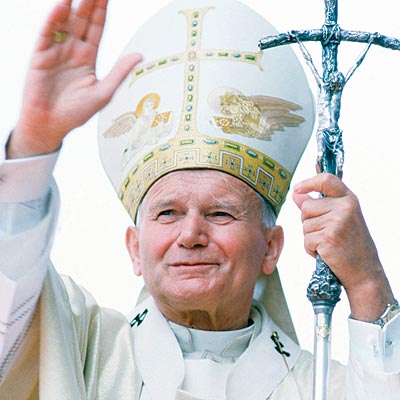Pope tries to woo secular French back to the Church
 Paris - Pope Benedict XVI spent the first day of his four-day visit to fiercely secular France trying to revive Catholicism in a country known traditionally as "the Church's eldest daughter."
Paris - Pope Benedict XVI spent the first day of his four-day visit to fiercely secular France trying to revive Catholicism in a country known traditionally as "the Church's eldest daughter."
Addressing 10,000 young people gathered late Friday in the square in front of Notre Dame Cathedral while tens of thousands of others watched the event on large screens erected around the venerable church, the 81-year-old Pontiff resurrected a phrase used by his popular predecessor John Paul II: "Do not be afraid!"
Relaxed and smiling, Benedict XVI appeared to view his first trip to France since being elected pope in April 2005 as a public relations mission to convince the French that the Church is not a threat to their secularism but is fundamental to their well-being.
The pope's visit comes at a time when the status of the Catholic Church is declining in France, with fewer people identifying themselves as Catholics and only a small minority regularly attending Mass.
A 2006 poll found that nearly two of three French adults described themselves as either agnostics or atheists, while in a more recent survey three out of four French adults said that the Church had no influence on French society.
But, addressing some 650 intellectuals, artists and scientists at the College des Bernardins earlier in the day, the pope insisted that spirituality was a vital element of society.
"What gave Europe's culture its foundation - the search for God and the readiness to listen to him - remains today the basis of any genuine culture," he said.
"Creation is rational," Benedict XVI declared. "A purely positivistic culture which tried to drive the question concerning God into the subjective realm, as being unscientific, would be the capitulation of reason... and hence a disaster for humanity."
The address had been widely anticipated, as it came exactly two years after Benedict XVI delivered a controversial speech in Regensburg, Germany, which angered many Muslims.
But Friday's oration was no doubt intended to antagonize few people, except perhaps those who regard religion and culture as necessarily distinct spheres.
The list of those invited to hear the speech included a broad cross-section of French notables, such as former French president Jacques Chirac, actor Michael Lonsdale and Catherine Millet, an art critic, curator and author of the memoir The Sexual Life of Catherine M, which one critic described as "the most explicit book about sex ever written by a woman."
Following the speech, the pope met briefly with representatives of France's Jewish community and then travelled in the Popemobile to the Notre Dame Cathedral, where he celebrated Vespers.
Along the route, he was greeted by thousands of cheering, banner-waving people, many of whom had traveled to Paris from all parts of the country.
Shortly after his arrival in Paris earlier Friday, the pope said that the continued separation of church and state was essential for religious freedom.
"It is fundamental ... to insist on the distinction between the political realm and that of religion in order to preserve both the religious freedom of citizens and the responsibility of the state towards them," Pope Benedict XVI said at a formal reception at the Elysee Palace hosted by President Nicolas Sarkozy and his wife.
The statement was intended to reassure the French that he had no objections to their notion of "laicity," a strict separation of religion and public affairs that is part of the national identity and has been law since 1905.
It was also a noteworthy echo of a speech Sarkozy himself made last December, when he called for a "positive laicity" and suggested that the state could ultimately grant subsidies to religious groups.
On Friday, in welcoming the pope to the Elysee Palace, the French president repeated his call, saying that "positive laicity offers our consciences the opportunity to discuss, by means of beliefs and rituals, the meaning we wish to give to our existence."
Describing the pope as "a man of conviction, knowledge and dialogue," Sarkozy said that "the spiritual quest is no danger to democracy."
On Saturday, following an open-air mass in Paris that is expected to draw some 250,000 people, the pope will travel to the pilgrimage site of Lourdes, in southern France, to celebrate the 150th anniversary of the apparition of the Virgin Mary to a 14-year-old peasant girl named Bernadette Soubirous in 1858. (dpa)